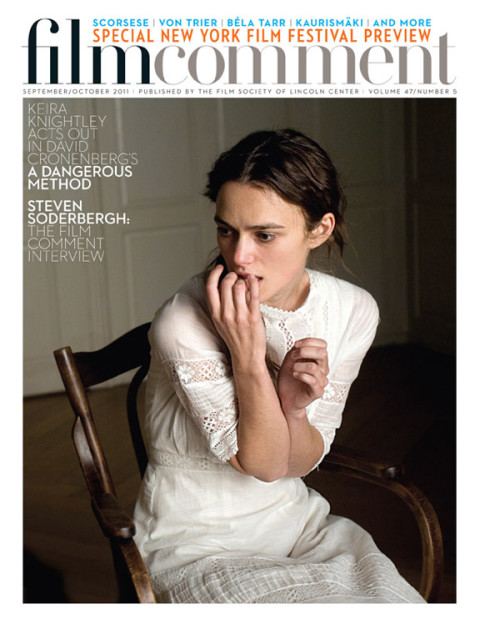
Following a four-day test run entirely focused on war-themed cinema in May 2010, the second edition of the Kinoforum branched out in length (now six days), subject matter (anything goes), and glitz (multiple prizes, nightly red carpet events). And considering the festival’s evident battle to choose between spectacle and pure love of movies, opening with a film as divisive as Pedro Almodóvar’s The Skin I Live In seemed fitting. Harking back to his earlier, more subversive work, the disturbed revenge tale oozes sexual and emotional cruelty—absolutely not for all tastes. “The worst Almodóvar ever” could be heard muttered at the post-screening reception. Personally, I disagree, and even appreciate it more and more as time goes by. But that’s one of the great things about festivals. They typically serve as a forum for journalists and other globe-trotting film dignitaries to debate what they’ve just watched.
The Kinoforum did convene round-table discussions addressing such topics as post-9/11 cinema, but what happens when, due to various glitches, film viewing itself becomes secondary? For starters, the usual end-of-day “what did you see?” chatter turns into “what didn’t you see and why?” Familiar tales of frustration were traded: the biggest disappointment, it quickly became apparent, was a lack of subtitles (surprise: every Russian offering, with the exception of a few competition entries, was off limits to non-Russian speakers). Also problematic were the occasional simultaneous live translations into Russian that drowned out English dialogue, delayed showtimes, projection issues, uninformed staff and volunteers, and unannounced screenings replacing scheduled ones.
Still, hitches of these kinds are to be expected—and can be much more easily forgiven—during a fledgling event such as this. So to be fair, it can be said that the limited access to films enabled journalists to do something they don’t often allow for: have fun. All too easily we can fall into obsessing over being fresh-eyed for that 8:30 a.m. screening and then cramming in as many movies as the day permits—more than our oversaturated minds can possibly process—because everyone fears that burning shame of missing the one masterpiece that nobody saw coming.
There is something to be said for major festivals like Sundance, Berlin, Rotterdam, and Thessaloniki taking place off-season: you rarely feel guilty about spending day and night immobile in dark, stuffy theaters. But because the Kinoforum unfolded this year from July 10 to 15, at the tail end of the White Nights, and is set against a backdrop as dramatically stunning as the city of Saint Petersburg, it would have been a real pity to have remained shut away indoors. (Kinoforum in fact does offer an alternative: open-air screenings held in the lovely Arts Square, though each film projected was in Russian, so again, no subtitles…)
And with some luck, quality work was to be found among the roughly 100 titles shown. Of the competition programs, the Best of the Best—an unfortunate designation for humble filmmakers when asked which section their film was part of—included Aki Kaurismäki’s sublime Le Havre, although the top prize went to Asghar Farhadi’s A Separation, which sadly I missed despite my best efforts. The New Territories competition, featuring work by young directors who made up with talent what they lacked in resources, offered some interesting new voices. I had already seen and liked Mike Ott’s Littlerock (which opens in New York City on August 12), and, because I’ve long held the belief that the advent of reality television was the beginning of the end of civilization, was drawn to Nevio Marasovic’s intriguing The Show Must Go On, about the contestants on a Big Brother–like show who are actually so shut off from reality that they haven’t a clue that the end of the world is looming. (Miaoyan Zhang’s Black Blood took home this section’s prize.) The red-carpet sector’s standout was Black Butterflies, a biopic driven by an exquisite performance by Carice van Houten as South African poet Ingrid Jonker, a free-spirited, outspoken woman ahead of her time, who battles with depression and her tyrannical politician father (played by Rutger Hauer), the government’s minister of censorship.

But beyond movies, hospitality was a major part of the festival’s agenda, and in addition to offering guests luxurious hotel accommodations, a daily lunch spread, and a nightly cocktail “hour,” they partnered with the Saint Petersburg International Festival & Celebration Center to assemble an impeccable lineup of cultural events. Participants were invited to sample a ballet at the legendary Mariinsky Theatre, pay visits to the Hermitage and the Russian Museum, tour the city by bus, soak up the sounds of a symphony on the bank of the Neva River, and, grandest of all, attend a banquet at Peterhof (Russia’s answer to Versailles) that featured a re-creation of a historic Baroque opera, followed by fireworks, a feast, and more fireworks—an evening of overindulgence and surreal beauty that no words could do justice.
So as an all-encompassing cultural fest, Kinoforum is unbeatable. The “film” part still needs work—something is clearly amiss that I saw nearly as many films on the flights to and from Russia as I did at the festival itself—but with the right balance and attention to correct presentation, it could easily develop into a dream destination. Or, rather, dreamier than it already is.
© 2011 by The Film Society of Lincoln Center








